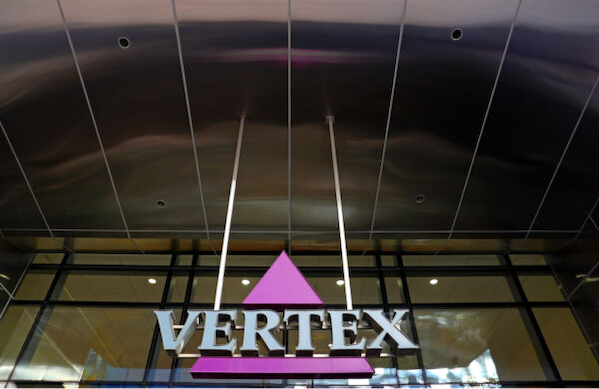Vertex’s CRISPR Gene Therapy Lands Another FDA Nod in a Rare Blood Disease
January 18, 2024
Source: drugdu
 599
599
The FDA approved Vertex Pharmaceuticals’ gene therapy Casgevy for treating beta thalassemia, an inherited blood disease that leads to low levels of functioning hemoglobin. Last month, the one-time treatment won its first FDA nod for treating sickle cell disease.
By FRANK VINLUAN
 A one-time CRISPR-based gene therapy developed by Vertex Pharmaceuticals and CRISPR Therapeutics now has an additional FDA approval as a treatment for the rare blood disease beta thalassemia.
A one-time CRISPR-based gene therapy developed by Vertex Pharmaceuticals and CRISPR Therapeutics now has an additional FDA approval as a treatment for the rare blood disease beta thalassemia.
The affirmative decision announced Tuesday for the therapy, Casgevy, was widely expected following its December approval in sickle cell disease, but it comes more than two months early. The target date for an FDA decision in the beta thalassemia indication was March 30. Casgevy won its first ever regulatory approval in the United Kingdom, a November decision that covered both sickle cell disease and beta thalassemia.
Beta thalassemia is an inherited disease in which genetic mutations lead to low levels of functional hemoglobin, the oxygen-carrying protein found in red blood cells. Low hemoglobin causes patients to develop anemia. Blood transfusions are a treatment option, but patients must undergo the procedure frequently and it introduces complication risks. The Bristol Myers Squibb drug Reblozyl is approved for treating the anemia associated with beta thalassemia, but this drug does not cure the disease and it reduces but does not eliminate the need for blood transfusions. A stem cell transplant is a potentially curative option, but requires a matched donor. Casgevy provides a one-time treatment option for transfusion-dependent beta thalassemia patients age 12 and older.
Casgevy is made from a patient’s own stem cells. In a lab, the CRISPR technology is used to edit a gene in these cells to produce high levels of fetal hemoglobin. Following a conditioning regimen to prepare the patient, the modified cells are infused, making their way to the patient’s bone marrow. After establishing themselves in the bone marrow, these cells are intended to produce red blood cells that carry fetal hemoglobin.
FDA approval of Casgevy in the beta thalassemia indication is based on results from an open-label, single-arm clinical trial that enrolled 59 adolescents and adults. In an interim analysis taken at 12 months, 32 of 35 (91.4%) evaluable patients had maintained transfusion independence. The three patients that did not achieve this mark still showed reductions in their annualized red blood cell transfusion requirements and transfusion frequency compared with their baseline measures.
The adverse event profile of Casgevy is consistent with a stem cell transplant and the accompanying preconditioning regimen for that procedure. The most common serious adverse reactions reported from the trial included blockage of blood vessels in the liver, pneumonia, hypoxia, low levels of oxygen in body tissues, and low levels of platelets.
Casgevy is now the second gene therapy approved for beta thalassemia, following the 2022 FDA nod for Zynteglo from Bluebird Bio. Zynteglo carries a $2.8 million wholesale price, but the biotech also offers an outcomes-based agreement that ties reimbursement of the therapy to the achievement and maintenance of transfusion independence. In sickle cell disease, Vertex set a $2.2 million wholesale price for Casgevy. The company said the price is the same for beta thalassemia. Evaluate, a firm that provides data, insight, and intelligence for the life sciences industry, projects that Casgevy could reach nearly $2.6 billion in sales by 2028. That forecast is contingent on the successful launch of the product in other regions, including Europe and Asia.
The nature of producing and administering Casgevy requires a clinical site to have experience in stem cell transplants. Vertex is providing the therapy through hospitals experienced with these procedures. The company said nine authorized treatment centers in the U.S. are currently able to offer Casgevy to eligible patients with beta thalassemia and sickle cell disease. More centers will be activated in coming weeks, the company said.
“On the heels of the historic FDA approval of Casgevy for sickle cell disease, it is exciting to now secure approval for TDT (transfusion dependent thalassemia) well ahead of the PDUFA date,” Vertex CEO Reshma Kewalramani said in a prepared statement, referring to the Prescription Drug User Fee Act that sets the timeline for FDA decisions on drug reviews. “TDT patients deserve new, potentially curative treatment options, and we look forward to bringing Casgevy to eligible patients who are waiting.”
Photo: David L. Ryan/The Boston Globe, via Getty Images
By editorRead more on
- The first subject has been dosed in the Phase I clinical trial of Yuandong Bio’s EP-0210 monoclonal antibody injection. February 10, 2026
- Clinical trial of recombinant herpes zoster ZFA01 adjuvant vaccine (CHO cells) approved February 10, 2026
- Heyu Pharmaceuticals’ FGFR4 inhibitor ipagoglottinib has received Fast Track designation from the FDA for the treatment of advanced HCC patients with FGF19 overexpression who have been treated with ICIs and mTKIs. February 10, 2026
- Sanofi’s “Rilzabrutinib” has been recognized as a Breakthrough Therapy in the United States and an Orphan Drug in Japan, and has applied for marketing approval in China. February 10, 2026
- Domestically developed blockbuster ADC approved for new indication February 10, 2026
your submission has already been received.
OK
Subscribe
Please enter a valid Email address!
Submit
The most relevant industry news & insight will be sent to you every two weeks.



